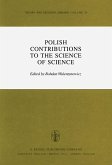The present volume helps to understand how the collection of miscellaneous disciplines, called the science of science, came into being. One tradition goes back to the Greek thinkers and includes practically every great name in the history of philosophy, since almost all philosophers took a stand on epistemological problems. To be sure, theory of knowledge is not to be identified with theory of science. Science is a relatively new phenomenon, dating from modern times. It is a source of knowledge, the main source (in our type of culture), but certainly not the only one. Also, epistemology deals with questions rather far removed from the practice of science. The nature of truth; the sources of knowledge; the limits of knowledge. Many people claim to understand science without being able to solve these perennial problems. What we call today the science of science is not concerned with, say, the Kantian question how synthetic a priori truths are possible. However, the influence of the philosophical heritage is still felt in present day metascientific thOUght. Philosophy of science does exist, although in a form very different from classical epis temology. It has developed (under that name) into general metho dology of science, which roughly means: analysis of scientific theories and analysis of their validation. In both cases, mathematical and logical tools playa great role. Scientific theories are analyzed by means of modern semantics (theory of models). Their valida tion is reconstructed in terms of probability and decision theory.
Bitte wählen Sie Ihr Anliegen aus.
Rechnungen
Retourenschein anfordern
Bestellstatus
Storno








